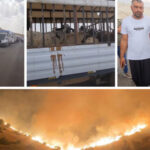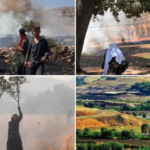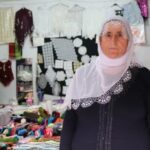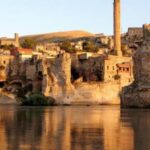Urfa, officially known as Şanlıurfa (pronounced [ʃanˈlɯuɾfa]; Kurdish: Riha) ; Ուռհա Uṙha in Armenian, and known in ancient times as Edessa, is a city in North Kurdistan / southeastern Turkey, and the capital of Şanlıurfa Province.
Urfa was conquered repeatedly throughout history, and has been part of a great many civilisations. It’s wider region includes excavation sites of some of the very first settlements in human history.
With 561,465 inhabitants, Urfa is a diverse city with Turkish, Kurdish, Armenian and Arab residents.

Fatoş Göksungur said that democracy depends on both ecological balance and women’s freedom, stressing that one cannot exist without the other.

Kurdish Shepherds started a solidarity campaign to give sheep to the villagers affected by the fire between Diyarbakır (Amed) and Mardin (Mêrdîn) in which 15 people lost their lives. They have already distributed 350 sheep and goats to the villagers.

In the summer of 2023, Mount Cudi is once again the site of significant wildfires, marking a recurring environmental challenge that has profound implications for the region which is an important part of the Kurdish geography. This event brings to the forefront an interview with Zozan Pehlivan, an environmental historian of the modern Middle East, the Ottoman Empire, and Ottoman Kurdistan, conducted in 2020, now translated into English by MedyaNews, that explores the intricate connections between ecology, economy, and history in Turkey, Kurdistan and beyond.

Bedia Şimay and Bedriye Tırak are the owners of a handicraft shop located in the Sur district of Amed. Two sisters sell the crafts made by women living in provinces such as Batman, Mardin, and Siirt in their shop to earn a livelihood. “We have provided employment opportunities for hundreds of women until now,” Bedia Şimay said.

Ecology is one of the three pillars of the paradigm of Democratic Confederalism, the political-theoretical concept of the Kurdish Freedom Movement. Besides democracy and gender liberation, ecology has been mentioned explicitly as a dimension in this concept since 2005. However to date, ecology is less discussed and practiced than the two other pillars.





